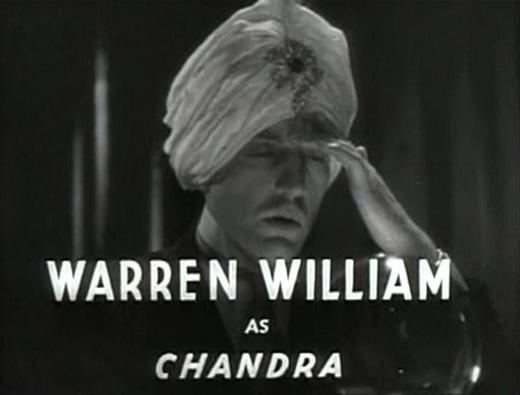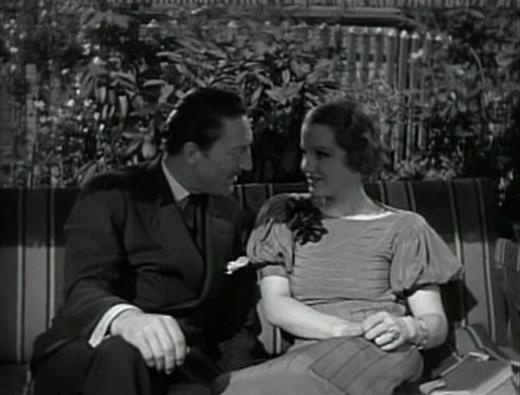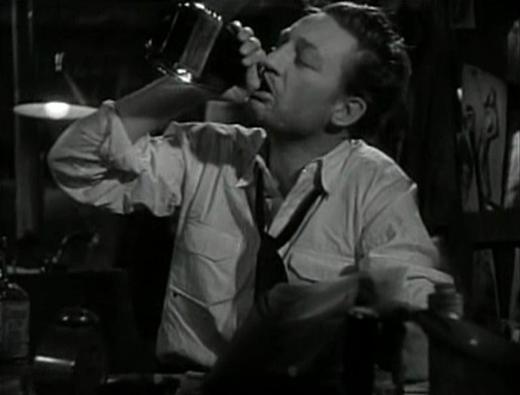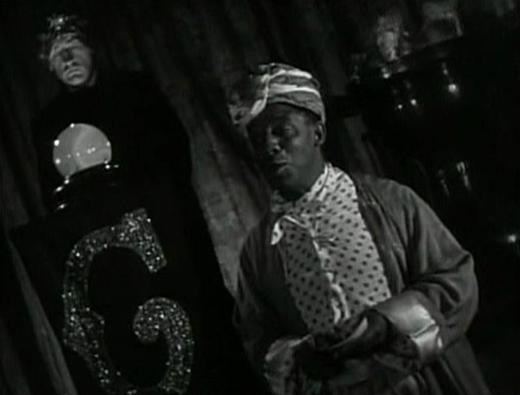I recently dug into this familiar title all over again to prepare for a discussion with Todd Liebenow of Forgotten Films on episode #48 of his Forgotten Filmcast podcast. I refer to The Mind Reader as a familiar title because I’ve covered it in the past on my Warren William site, but that was back in 2012. It seemed like a good time to take advantage of my more recent notes to post about this pre-Code favorite over here, on Immortal Ephemera.
 The Mind Reader was released on April Fools’ Day, April 1, 1933. Perfect timing for the yaps, er, I mean movie patrons, to settle in for 70-minutes tracking the evolution of an unsuccessful snake oil salesman into a psychic con man, who hits it big—or at least big enough—until he’s done in by the love of an honest woman.
The Mind Reader was released on April Fools’ Day, April 1, 1933. Perfect timing for the yaps, er, I mean movie patrons, to settle in for 70-minutes tracking the evolution of an unsuccessful snake oil salesman into a psychic con man, who hits it big—or at least big enough—until he’s done in by the love of an honest woman.
Warren William stars and this time he’s so slippery that I barely know what to call his character. You see, we meet him as Dr. Le Blanc, the painless dentist, and then he’s Dr. Zukor, proprietor of a hair tonic aimed at an African American clientele. He doesn’t even bother with a name when he’s a carnival barker trying to convince patrons to look up at his pal and partner Frank (Allen Jenkins) as he works a flagpole sitting gimmick. None of it’s going over because, as Frank suspects, “Must be the Depression, or something.” A bit of both, I suppose. When the pair notice a swami (Robert Greig, usually a butler!) filling his tent with customers, they see a new and easy gimmick to conquer. Warren can finally settle on a single moniker, for a little while at least, after he spots a name he likes on a package of cookies. Deepening his voice and touting himself “Chandra the Great,” the Warren William character ties a bath towel around his head and practices his gaze over a hotel room lamp.
“The whole world’s full of hopeless suckers,” Chandra tells Frank. “Just keep promising them things, they’ll believe you.”
We first see the boys put their act to the test in Kokomo, Indiana. Like most old-time cons, what’s most fascinating about their mind reading swindle is just how mechanical the entire trick is. Chandra appears on the stage, acting mysterious, while his assistant, Sam (Clarence Muse), interacts with the audience and collects their handwritten fortune-telling requests. Chandra then has Sam “consign them to the flame” and the folded up pieces of paper are dumped into a small vat that the audience next witnesses Sam set ablaze. What the audience doesn’t witness is the bottom of this mysterious container opening up and their questions sliding down a pipe to Frank, who sits under the stage, where he’s soon joined by Sam. A wire connects Frank to Chandra, running straight up Chandra’s shirt and into his turban. Frank reads the audience’s questions to Chandra through the wire, and Chandra speaks slowly to the audience in his deep psychic voice, amazing them by repeating their questions, though providing mostly comic answers.
The act goes over big. After Chandra’s performance, Frank sets up appointments for private readings at a buck a pop. “How are the suckers, you get any nibbles?” Chandra asks. “Five yaps,” Frank says before proudly displaying the purse he also lifted off one of their customers. Before Chandra can finish scolding him the woman (Clara Blandick) comes looking for her purse. Chandra is perfectly willing to brush her off, until her beautiful niece, Sylvia (Constance Cummings), joins them and the mind reader instead goes into his act. Soon enough, Sylvia is on board, employed by Chandra as a secretary, and married to him before the train makes too many more stops.
They’re not married for long before trouble catches up to Chandra. Sylvia overhears him talking with Frank and learns her wedding ring is a hot piece of jewelry that Frank snatched as part of one of Chan’s shows. On top of this, a desperate woman (Mayo Methot) tracks Chandra down and confronts him over the decisions he steered her to make. She tells him off and blames him for ruining her life before Frank pushes her out the door. Outside of Chandra’s apartment, the woman notices the open elevator shaft and in a moment that is as shocking as much as it is expected, she leaps to her death.
“I hate every rotten crooked thing you represent,” Sylvia says to Chandra, planning to leave him. Chandra is contrite. He promises to give up the mind reading racket. And he means it. Chandra is being as straight as the picture we’re shown, unlike the shots of him plying his trade, which are always steeply angled making him appear as crooked as his actions.
Chandra gives up the easiest money he’s earned in a long time to settle into a New York apartment with his wife and become a brush salesman. That’s right, Chandra goes door to door throughout the city, ringing doorbells and trying to sell a variety of brushes. If it seems like lousy work, it was. A 1938 Fortune magazine feature about Fuller Brush salesmen tells of the high turnover of their peddlers, while noting, “this kind of work is naturally and fundamentally distasteful to most men,” and “when other lines of work are open … it is hard to get enough salesman.” This certainly reflects Chandra’s experience as he is completely dispirited when his old buddy Frank catches up to him on the city streets and asks him what he’s up to.
“Selling brushes. And getting nothing but flat thumbs from pushing doorbells.”
Frank, who’s landed a cushy chauffeur’s job, can’t believe it: “A guy with your con, your larceny, selling brushes. What’s the idea?”
“I’m on the straight and narrow,” Chandra says, his voice the tone of a little boy sent to his room without dinner. “You know, the wife.”
Frank tempts him back into the racket by suggesting he can serve as mind reader to society. Frank buys bedroom tip-offs from his chauffeur buddies and feeds the inside information to Chandra, now known as Dr. Munro, who provides private readings at exorbitant prices. This works well for a while, paying the bills for the Chandra family, until the Dr. Munro scheme backfires by rousing an angry husband and seeping into Sylvia’s personal life by ruining a friend’s marriage. Dr. Munro, formerly Chandra, winds up working under the name of “The Great Divoni” in Tijuana, where he drowns his sorrows in booze until ultimately waking up and realizing what he’s lost.
“Everything about me is crooked,” Chandra declares. “Every mind reader is crooked!”
The Mind Reader was the third of four Warren William movies directed by Roy Del Ruth, whose pre-Code era Warner Bros.-First National list of credits is even more exciting than William’s. In addition to directing William in Beauty and the Boss (1932), Employees’ Entrance (1933), and Upperworld (1934), Del Ruth kept other contract stars on their toes with slick contemporary-based titles like Blonde Crazy (1931), Winner Take All, Taxi! (both 1932), and Lady Killer with James Cagney, plus Blessed Event (1932) with Lee Tracy. While Cagney’s stardom stretched a lot longer and further than William’s or Tracy’s, at this time each of those actors were often cast as characters who were almost always highly flawed, atypical heroes. Del Ruth worked as fast as his character’s mouths moved, typically filming each of his films in around two weeks time. He completed work on The Little Giant (1933) with Edward G. Robinson is just nine days!
 The Mind Reader was an unproduced play by Vivian Crosby that Warner Bros. purchased for William Powell in August 1932. Warren William replaced Powell—as he also had on The Dark Horse (1932)—and was slated to star with Bette Davis, who he had worked with in Three On a Match (1932), The Dark Horse, and then later in Satan Met a Lady (1933). A few days later Constance Cummings was borrowed from Columbia to play Sylvia with Davis instead assigned to a better role in a lesser movie, Ex-Lady (1933).
The Mind Reader was an unproduced play by Vivian Crosby that Warner Bros. purchased for William Powell in August 1932. Warren William replaced Powell—as he also had on The Dark Horse (1932)—and was slated to star with Bette Davis, who he had worked with in Three On a Match (1932), The Dark Horse, and then later in Satan Met a Lady (1933). A few days later Constance Cummings was borrowed from Columbia to play Sylvia with Davis instead assigned to a better role in a lesser movie, Ex-Lady (1933).
Critics praised the performances, but generally thought The Mind Reader was a middling production at the time of its release.
The movie has aged well, benefiting from the fairly recent resurrection of Warren William as a pre-Code favorite, the obvious yet effective camera work of Sol Polito, and the little historical details hiding in almost every corner of a movie filmed during the very specific period between the time of Roosevelt’s election and inauguration. This was a very low time of the Depression with Hoover a lame duck President and Roosevelt chomping at the bit to get into office and begin exercising change. Regarding more specific instances in The Mind Reader it was produced at a time when Warner Bros. theaters employed renowned psychic Gene Dennis to perform on stage before the movies rolled; when the Fuller Brush man pounded the pavement out of necessity; and just after the election of Roosevelt enabled Allen Jenkins to call out his final line: “It sure is tough to be going away just when beer’s coming back.”
Admittedly the ending is weak, providing a tacked-on resolution that Del Ruth and company reconvened to film in January 1933. Otherwise Warren William and Allen Jenkins keep The Mind Reader entertaining and the small snapshots of its specific time make it more intriguing with each passing year.
The Mind Reader is one of four pre-Code titles included on Warner Archive’s Forbidden Hollywood, Volume 5. Other titles in the set are Miss Pinkerton (1932) with Joan Blondell, Hard to Handle (1933) with James Cagney, and Ladies They Talk About (1933) with Barbara Stanwyck. My copy and the screen captures accompanying this post are from a past recording off of Turner Classic Movies.
That set represents The Mind Reader’s first time on home video. Released in August 2012, it’s now had plenty of time to be reviewed by several classic film bloggers including Pre-Code.com, Thrilling Days of Yesteryear, The Hollywood Revue, and Cinematically Insane, where Will reviews the contents of the entire set (plus Volume 4 too!).
Once again, my WarrenWilliam.com post is HERE and you can listen to my recent discussion with Todd on the Forgotten Filmcast about The Mind Reader HERE.

Above found in Picture Play magazine, May 1933 issue, page 35. Discovered through Lantern search.











[…] I wrote about The Mind Reader on this site back in 2012, but since I watched it another couple of times (okay, three) and took another whole set of notes I decided to post about it again over at Immortal Ephemera. You'll find that new post HERE. […]